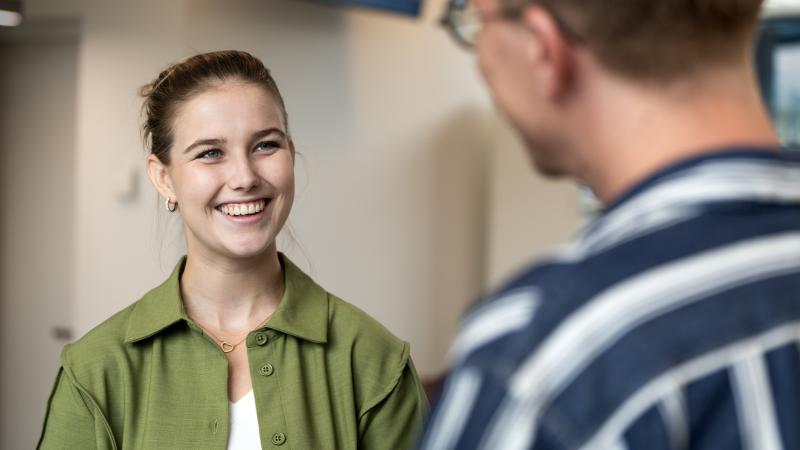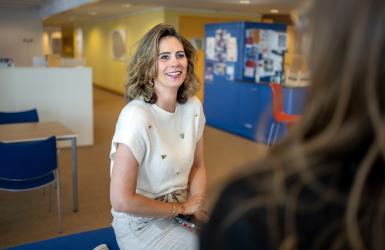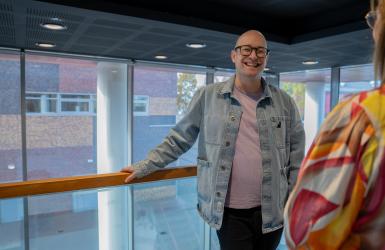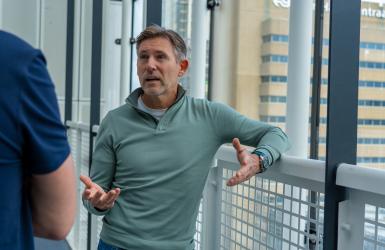The story of Evelien, staff adviser Human Resources (HR)
'Healthy and happy staff' When Evelien joined the IND in 2016, she only planned to spend two years here to gain experience.…

The IND is a large organisation, but I didn’t feel lost for a moment.
Those who have followed the news in recent years haven’t been able to avoid it. Migration, asylum and reception are in the public eye. Lotte also read about refugees, reception centres and war in the newspapers. ‘Intense and interesting at the same time. What happens to those people when they arrive here? What are their rights and obligations? I wondered about that. My social legal services programme focuses on both the legal and social aspects of a situation. Ideally, I wanted to do my internship with an organisation that I thought was interesting and where I could combine these two themes. The IND aligned well with this.’
Lotte was an intern for four days a week. Two of these days, she worked in the application process. ‘I entered the world of asylum step by step. In the application process, I conducted reporting interviews under supervision with asylum seekers whose applications were likely to be granted. You then try to get a complete picture of the applicant. Who are you? Where are you coming from? What did you do in your life in terms of work or education? Those are the kind of questions I ask in an interview. At the beginning of my internship, I watched and listened to an experienced staff member. Then, I started to do more and more myself. First, someone was still next to me, so that I could consult them on the spot. After a while, we transitioned to ‘remote supervision’. In principle, I conducted the reporting interview all by myself. I could ask short questions via Skype and discuss in the break if needed.’
The remaining two days, Lotte studied how applications are processed. Here too, she only looked into applications from countries that were likely to be granted. ‘Shadowing was a little bit more difficult in that field and for the detailed interviews,’ says Lotte. ‘In a detailed interview, you go into the reasons for asylum: what is the reason why someone has left the country of origin and is unable to return? And for that, there needed to be a case of someone from Syria, Yemen or Turkey. Moreover, a staff member had to be available to assist me who was fully competent to conduct interviews and make decisions. And that combination wasn’t always there. So, within the asylum process I usually made decisions. I completely delved into the file I was given and assessed it against the application requirements. Then, I wrote a decision saying why I would admit someone. Of course, we look critically at cases that are likely to be granted, but it so happened that the decisions were positive in all my cases.’
Lotte thought her internship at the IND was exiting and fun at the same time. ‘My supervisors were so encouraging that it didn’t take long before I confidently conducted a reporting interview. The work is varied and I encountered all sorts of things. Although I was supervised on cases that were likely to be granted, it happened that I had someone from another country in front of me. An Algerian, for example, posing as a Syrian. This would already become evident from preliminary investigation and the interpreter was also unable to understand him. Still, he had to tell this himself during the interview. This is where I could express my creativity: how was I going to do this? I asked questions, and consulted with my supervisor and a couple of experienced IND staff members. It felt good that I could actively participate and that my input was also taken seriously. Eventually, the applicant admitted that he wasn’t from Syria. Then, after consultation, I was allowed to complete the interview by following the procedure for Algeria. And that was a challenge!’
The work aligned well with Lotte’s ambitions and interests. In addition, she was received and supervised well by the IND. ‘It’s a large organisation, but I didn’t feel lost for a moment.’ Instead, there was this sense of connectedness. I think that’s also because of the work you do: it’s intense and you seek support from your colleagues. It’s special that your work has a direct impact on another person’s life. I really felt I could make a difference. Sometimes, I was facing someone who was already so happy and grateful just because I listened to their story. That touches you.’
Are you looking for an internship? Lotte would know where to go! ‘Do you really want to make a difference for someone? And do you like being socially involved? Then the IND is a really good place for an internship. I’ve learnt a lot, about myself, about law and about the job. I was allowed to look everywhere if I wanted to. It’s hard work, but you really get something back from it. It’s very gratifying.’

'Healthy and happy staff' When Evelien joined the IND in 2016, she only planned to spend two years here to gain experience.…

‘A single conversation can change someone’s day, week, or even their life’ Anyone who contacts the IND with questions about an application, a residence permit, or…

‘I translate wishes into practical solutions’ Marco initially started working at the IND as a self-employed person, but he quickly felt at home…